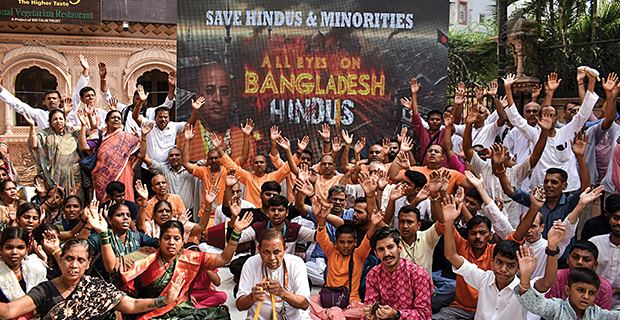Tragically, Hindus Unsafe
The recent spate of attacks on religious minorities, their temples including ISKCON and other Sufi Shrines in Bangladesh has unveiled a growing crisis that threatens the country’s religious harmony and the broader stability of South Asia. The systematic targeting of Hindu and Buddhist temples along with Sufis by radical Islamist groups reveals a coordinated effort to dismantle Bangladesh’s pluralistic foundations.
More than 50 shrines, including the revered Murshidpur Pir’s shrine in Sherpur, have been desecrated, looted, or destroyed, with the brutality of these attacks escalating alarmingly. The Murshidpur incident, where valuables were stolen, the shrine was set ablaze, and an innocent individual was killed, exemplifies this violent extremism. The silence of the Bangladeshi interim government, under the Yunus Khan administration, amplifies the severity of the situation.
The situation reflects the ongoing challenges faced by Hindus and other minorities like Christians and Buddhists in Bangladesh. The Hindu community has dwindled from around 22 per cent of the population during the 1971 Liberation War to roughly 8 per cent today, with increasing reports of violence and discrimination. Significantly, in more than 2,000 documented acts of violence against Hindus, Christians and Buddhists in Bangladesh, at least nine minority members have been killed so far.
What makes these attacks particularly disturbing is their broader cultural and historical implications. Bangladesh’s shrine culture has been a hallmark of peaceful coexistence, bringing together people of different faiths under the banner of Sufism’s humanistic values of peace, tolerance, and unity. By attacking these shrines, extremist groups are not just targeting places of worship; they are assaulting the very fabric of a centuries-old tradition that has resisted religious exclusivism. The inclusion of Hindu temples especially ISKCON in this wave of destruction underscores the deliberate nature of these attacks, designed to sow fear, chaos, and division among Bangladesh’s diverse communities.
While the gravity of these crimes demands swift and decisive action, the government’s response has been weak at best and complicit at worst. Instead of apprehending and prosecuting the perpetrators, the government has chosen the path of dialogue with extremist factions. This approach not only emboldens these groups but also signals that such acts of violence can occur with impunity. The failure to uphold justice is rapidly eroding trust in the state’s ability to protect its citizens, particularly religious minorities.
The international community’s selective activism further complicates the situation. Western human rights organizations and governments have demonstrated a glaring double standard in their responses to human rights abuses. While atrocities in politically convenient regions like China and Russia garner widespread condemnation and mobilization, the plight of minorities in South Asia often goes unnoticed. For example, global campaigns for Uyghur Muslims in China stand in stark contrast to the near silence surrounding the abduction of Baloch women in Pakistan or the harassment of Hindu girls in Sindh. The selective outrage not only undermines the credibility of these organizations but also leaves vulnerable communities without critical international support.











Comments.